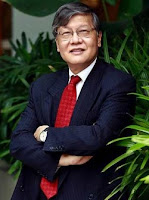 Early in the morning I tend to begin my day with reading articles from the media in France, Malaysia, UK, Deutschland, España, Estados Unidos (in Spanish), US, Brasil, Chile, South Africa, Nederland.
Early in the morning I tend to begin my day with reading articles from the media in France, Malaysia, UK, Deutschland, España, Estados Unidos (in Spanish), US, Brasil, Chile, South Africa, Nederland.Then I use certain key words (such as 'global currency', 'international monetary reform' and 'carry trade') to do a "Search News" in various languages, which provides me with more interesting articles from various websites including the press agencies.
When I find an article interesting, I send it to myself and, when I think it might be of interest to one or more members of the Fondad Network (the picture above is of one of them, Charles Wyplosz, and the picture below of another, Andrew Sheng), I send it to them as well, highlighting a few paras or quoting the article fully, and raising a question.
Based on these articles an interesting discussion may develop between a few members of the Fondad Network (which is larger than the one included on the Fondad website), and if I think the discussion is of interest to the larger Fondad group, I send it to them too.
It would take me too much time to report on these discussions in this blog -- as I have done sometimes in the past. However, I'd like to share with you a few thoughts that were exchanged recently about zero-interest rate policy (ZIRP).
The discussion started with an article I sent around in which it was argued, "by pegging interest rates at zero percent, the Fed is inflating speculative bubbles worldwide [including China]".
This prompted Charles Wyplosz to say that this statement was not only totally misguided reasoning but also very dangerous. "The Fed deals with US economic and financial conditions, which are weak enough to justify very low interest rates. The impact on China only exists because the Chinese authorities have decided to peg the RMB to the dollar," he stressed.
 Andrew Sheng responded, "Charles, who is really being helped by the low interest rates? I can understand why the real sector needs zero interest rates but the 30 year fixed rate mortgage is still 5% per annum, more in real terms. The real winners are the bankers who pay themselves massive bonuses on the back of government guarantees and subsidies from the central banks and then depositors around the world."
Andrew Sheng responded, "Charles, who is really being helped by the low interest rates? I can understand why the real sector needs zero interest rates but the 30 year fixed rate mortgage is still 5% per annum, more in real terms. The real winners are the bankers who pay themselves massive bonuses on the back of government guarantees and subsidies from the central banks and then depositors around the world."Charles Wyplosz retorted, "Assuming that the zero interest rate policy has the effect that you describe, and only that effect, it is redistribution within the US, something that is striclty a US issue. It has no bearing whatsoever on China's monetary policy."
Subsequently, I sent around an article by Andrew Sheng, "A year in crisis - who pays?", in which he says:
"Thanks to the zero interest rate policies, the world is one big carry trade and emerging markets are very bubbly.
Investors are now once again caught between greed and fear. Greed drives a lot to join the momentum play, fear rising as prices go higher and higher. (...)
It is not surprising that the world is schizophrenic about both deflation and inflation.
Economists like Paul Krugman and Nouriel Roubini are in the camp of deflation, whereas investors like George Soros and Warren Buffett are signaling that they are worried about inflation.
Of course, for those with lots of debt, inflation would be welcome because that inflates away the real value of the debt. For those savers whose returns are not higher than the inflation rate, they will share the burden of the inflation tax.
What is quite clear is that most of the world is going to pay for this crisis. So, please send a Christmas card to those Wall Street bankers who are enjoying record bonuses to remind them that all of us are paying for their party."
If you want to read the full article by Andrew Sheng, the link is here.
